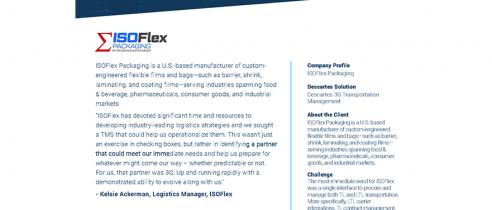Blog
Your Guide To Freight Management

Updated on September 30, 2024
Running a retail business is tough, and you’ve got a lot to juggle—product sourcing, customer service, inventory management, and of course, shipping. Whether you’re moving products across town or shipping orders around the world, freight management is a critical part of your operations. It’s not just about getting products from Point A to Point B. It’s about doing it smartly—saving time, cutting costs, and keeping customers happy.
This guide outlines why freight management isn’t just a behind-the-scenes process—it’s a key factor that can help streamline your operations and grow your business.
What Is Freight Management?
At its core, freight management is all about strategically moving your goods from where they are to where they need to be, all while making the process as cost-effective and efficient as possible.
Think about it like this: every product you sell has to go on a journey. That journey involves finding the right carriers, choosing the best shipping routes, complying with regulations, and most importantly, keeping everything on track and on time. Freight management is what makes sure your customers get their orders on time, and your logistics costs don’t go through the roof.
Freight management isn’t one-size-fits-all. It involves multiple transportation methods like road, sea, air, or rail. For some smaller retailers, handling local deliveries may be all you need. But as your business grows, you’ll likely need to coordinate shipments across multiple carriers or even internationally. That’s where having a strong freight management system comes into play.
There are tools that make this easier. Technology, like a Transportation Management System (TMS), takes the guesswork out of this complex process. With a TMS, you can automate a lot of the details—finding the best carriers, tracking deliveries in real-time, and ensuring that everything runs smoothly.
The Freight Management Process: Key Components
Managing your freight isn’t a one-step process. There are many moving parts, each crucial to making sure your products get where they need to go. Let’s break down what goes into a solid freight management strategy.
1. Carrier Selection
Who you trust to move your products is a big deal. Not all carriers are created equal, and choosing the wrong one could mean late deliveries, damaged goods, or worse—lost packages. Here’s where your options come in:
- Private Fleets: If you’re a retailer with high shipping volumes, you might consider owning your own fleet. It’s expensive, but it gives you complete control over your delivery schedules and logistics. Think Amazon.
- Third-Party Carriers: This is the most common option for retailers. Think companies like FedEx or UPS, which have the infrastructure to handle both domestic and international deliveries.
- Freight Brokers and Forwarders: Freight brokers find the best rates for you by working with multiple carriers, while freight forwarders take care of extra services like packaging and paperwork.
By choosing the right partner, you ensure your products reach customers quickly and safely.
2. Route Optimization
Shipping isn’t just about putting products on a truck and hoping for the best. To keep costs down and deliveries on time, you need to figure out the best route for each shipment. That means considering things like traffic, fuel costs, and even weather. Using technology like a TMS makes it easy. These systems find the most efficient routes, ensuring your deliveries are smooth, fast, and cost-effective.
Imagine knowing exactly which route will get your products delivered faster, avoid traffic, and even save on fuel costs. That’s what route optimization does for your business, and it’s a game-changer for keeping your customers happy and your shipping costs low.
3. Documentation and Compliance
If you’re shipping internationally or dealing with a lot of different carriers, paperwork is a necessary evil. Freight management includes making sure all the proper documents are filed—bills of lading, packing lists, customs declarations, and more. And you’ve got to comply with all the shipping regulations, both domestic and international, to avoid costly delays. A solid TMS takes the hassle out of this by automatically managing these documents, so you don’t have to worry about anything slipping through the cracks.
4. Shipment Tracking and Tracing
Your customers want to know when their package is arriving, and so do you. Real-time shipment tracking lets you and your customers see exactly where an order is from the moment it leaves the warehouse to when it lands on their doorstep. By offering this kind of transparency, you build trust with your customers, and they’ll feel confident in ordering from you again.
Tools like GPS and RFID have enabled delivery tracking at every stage. And the technology is evolving rapidly. This isn’t just useful for providing updates to customers; it also helps you catch potential delays or issues early on, so you can adjust before they become real problems.
Why Freight Management Is Essential for Retailers
Freight management is about much more than shipping, and it can make a real difference to your bottom line. Here’s how:
1. Cost Efficiency
Shipping costs add up. Without proper freight management, you could be spending more than necessary. By optimizing your shipping process, consolidating shipments, and negotiating better rates with carriers, you can drastically reduce your shipping expenses. A good freight management system helps you save by making sure you’re always provided with the best options.
Businesses that use a TMS can see savings of between 5% and 15% on their overall freight costs, according to MarketsandMarkets. Those savings can be funneled back into other areas of your business, whether it’s marketing, inventory, or customer service.
2. Time Savings and Increased Efficiency
Time is money, right? Managing logistics can be a full-time job if you’re doing it manually. From hunting down the best shipping rates to keeping track of where your packages are, it’s easy for things to fall through the cracks. With a transportation management system in place, you can automate most of these tasks, saving you time. This means fewer headaches for you and your team and more time spent growing your business.
You’ll also get your products to customers faster and more reliably, which is always a win in terms of customer satisfaction.
3. Improved Customer Satisfaction
Happy customers are the lifeblood of any retail business, and shipping is a huge part of that. Customers want to know when their package will arrive, and they want it on time—every time. According to a report by Metapack, 70% of customers are more likely to buy from a company again if they can track their order in real-time.
When you offer accurate tracking and fast delivery, you’re not just meeting expectations—you’re exceeding them. And that leads to more repeat business, positive reviews, and higher customer loyalty.
4. Risk Mitigation
Let’s be real: shipping doesn’t always go smoothly. Packages get damaged, deliveries are delayed, and sometimes, they go missing altogether. Without a solid freight management process in place, you’re left to deal with these issues on your own. A good freight management system helps you track shipments in real-time, file claims for lost or damaged goods, and handle any disruptions quickly and efficiently.
Leveraging Technology for Freight Management
Technology has revolutionized freight management, making it easier than ever for retailers to streamline their logistics. Here’s how the latest tools can help you run a more efficient shipping operation:
1. Transportation Management Systems (TMS)
A TMS is your best friend when it comes to organizing your shipping process. It helps you manage everything in one place—choosing carriers, optimizing routes, tracking shipments, and handling paperwork. The best part? It does all of this automatically, freeing up your time to focus on other aspects of your business.
TMS platforms provide retailers with real-time visibility into their entire logistics operation. Need to know which carrier is the most reliable for shipping to a specific region? TMS can tell you. Wondering if you’re getting the best rates on your shipments? TMS helps you compare and choose the most cost-effective option.
2. Smart Devices and Mobile Apps
We live in a mobile world, and freight management is no exception. With smartphones and tablets, your drivers, warehouse staff, and logistics managers can stay connected at all times. Whether it’s scanning barcodes, checking inventory, or updating shipment statuses, mobile apps make the entire process more streamlined and efficient.
These apps also allow for real-time communication between drivers and your team. Need to reroute a delivery because of traffic? No problem—your driver can get updates instantly, avoiding delays and keeping your deliveries on schedule.
3. GPS and Tracking Systems
Customers have come to expect real-time tracking, and GPS systems make this possible. Knowing exactly where a shipment is at any given moment provides peace of mind for both you and your customers. Plus, if there are any delays, you can act quickly to adjust routes and avoid disappointing your customers.
GPS tracking isn’t just for customer updates. It also helps you optimize your delivery routes, saving fuel costs and reducing delivery times. For a retail business, this means smoother operations and a better customer experience.
4. Data Analytics
Data is at the heart of modern freight management, and leveraging it can give your retail business a significant competitive edge. With the right analytics tools, you can collect, analyze, and act on vast amounts of information regarding your shipments, helping you make smarter decisions and optimize your logistics processes.
For example, data analytics can tell you which carriers consistently deliver late, allowing you to switch to more reliable options. It can also highlight inefficiencies in your shipping routes or identify periods of peak demand when you should increase your carrier capacity. This means you’re not relying on guesswork but making informed decisions that will save you both time and money.
Predictive Analytics for Smarter Planning
With predictive analytics, you can anticipate shipping delays before they even happen. By analyzing historical data—like peak traffic times, weather patterns, or recurring delays—you can foresee potential disruptions and plan around them. This gives you the ability to reroute shipments in advance or adjust carrier selection to avoid bottlenecks.
For example, if you know that one of your products sees a surge in demand every holiday season, predictive analytics can help you arrange for additional carrier support well in advance, ensuring you’re ready to meet that demand without running into capacity issues.
Improving Efficiency with Historical Data
Your business likely already generates a ton of data—shipment histories, customer orders, delivery times—but are you using it to its full potential? By analyzing past performance, you can pinpoint inefficiencies and find ways to improve. Maybe a particular carrier always delivers late to certain regions, or perhaps specific routes consistently lead to higher fuel costs. Armed with this information, you can make better decisions that will improve both your bottom line and customer satisfaction.
Choosing the Right Freight Management Partner
If handling logistics in-house seems like too much, finding the right freight management partner can be a game-changer for your retail business. The key is to choose a partner who understands your business’s unique needs and can offer solutions that align with your growth strategy. Here’s what you should look for:
1. Reputation and Reliability
The reputation of your freight management partner means a lot. You’re trusting them with one of the most critical aspects of your business. So, it’s crucial to choose a partner with a proven track record.
- Do they have positive reviews?
- Can they provide testimonials or case studies?
- Are they known for timely deliveries and good customer service?
These are the kinds of questions you need to be asking.
Additionally, consider how long the company has been in business. Experience matters when it comes to handling the complexities of logistics, especially when things don’t go as planned. An established freight management provider is more likely to have strong carrier relationships, which can help secure better rates and ensure capacity during peak times.
2. Service Offerings
Not every freight management provider offers the same range of services. Some specialize in domestic shipping, while others have the expertise and infrastructure to handle international shipments. Depending on your business’s size and scope, you’ll want a partner that can meet all your shipping needs—whether it’s local deliveries or cross-border logistics.
Also, look at the value-added services they provide. For example, can they handle warehousing, freight consolidation, or packaging? These extras can make a big difference in streamlining your logistics and cutting down on operational complexity.
3. Technology and Integration
Your freight management partner should be using the latest technology to make the shipping process as seamless as possible. Look for a partner who offers advanced tools like TMS platforms, real-time tracking, and data analytics. These technologies provide visibility into your shipments and allow you to optimize every aspect of your logistics operations.
Equally important is how well their systems integrate with yours. If you already use an ERP or inventory management system, your freight management partner’s technology should work seamlessly with it. Integration ensures smooth data flow, minimizes errors, and keeps your supply chain running smoothly.
4. Customer Service and Communication
In the world of logistics, things don’t always go according to plan. Whether it’s a delayed shipment, an unexpected customs issue, or bad weather, problems can and do happen. That’s why having a freight management partner with excellent customer service is crucial. You want someone who can respond quickly to any issues and keep you informed.
Look for a partner that offers 24/7 customer support. This way, you can get help whenever you need it, regardless of time zones or business hours. Clear, proactive communication is key. You need to know what’s happening with your shipments in real time, and a good freight management partner will make sure you’re always in the loop.
Is Outsourcing Freight Management the Right Move?
At this point, you’re probably wondering: should I outsource freight management? The answer depends on your business’s needs, but for many retailers, outsourcing this critical function can free up time, reduce costs, and enhance operational efficiency. However, like any business decision, it comes with pros and cons.
1. Pros of Outsourcing Freight Management
One of the biggest advantages of outsourcing is cost savings. Freight management providers can leverage their relationships with carriers to negotiate better rates, which they pass on to you. They also have the technology and expertise to optimize every aspect of your logistics, saving you both time and money.
Another major benefit is that it frees you from the complexities of logistics. Managing shipping in-house can be overwhelming, especially as your business grows and your shipping needs become more complex. By outsourcing, you can focus on running your retail business, knowing that your freight management is in good hands.
Outsourcing also gives you access to the latest technology without the need for heavy investments. Freight management companies typically use advanced TMS platforms, real-time tracking, and data analytics, so you can take advantage of these tools without having to build the infrastructure yourself.
2. Cons of Outsourcing Freight Management
On the flip side, outsourcing freight management does come with some challenges. The biggest one is the potential loss of control. When you hand over your logistics to a third party, you’re trusting them to handle a critical part of your business. If the provider doesn’t fully understand your needs or fails to deliver, it can hurt your business.
There’s also the risk of strategic misalignment. Not every freight management provider will share your long-term goals or business priorities. For example, they might prioritize cost savings over customer satisfaction, which could lead to delays or service issues that hurt your brand.
Lastly, if the provider’s systems don’t integrate smoothly with yours, it can lead to communication breakdowns, delays, and missed shipments. Before outsourcing, make sure your systems and processes will work well together.
Is Freight Management Right for Your Business?
At the end of the day, freight management is about much more than just moving products. It’s about streamlining your operations, saving on costs, and delivering a better experience to your customers. Whether you choose to manage your logistics in-house or outsource it, investing in freight management tools and strategies is key to growing your retail business and keeping your customers happy.
Technology has made it easier than ever to take control of your logistics. Tools like TMS platforms, real-time tracking, and data analytics give you full visibility into your supply chain and allow you to optimize everything from carrier selection to delivery routes. And with the right freight management partner, you can take your logistics operations to the next level—scaling your business without sacrificing efficiency or customer satisfaction.
As the retail landscape becomes more competitive, businesses that prioritize freight management will have a distinct advantage. So, whether you’re just getting started or you’re ready to take your logistics operations to the next level, now is the time to invest in the right tools and partnerships.
Sources:
- “Transportation Management Systems Market – Global Forecast to 2028.” MarketsandMarkets, 2023.
- “E-Commerce Customer Expectations Report.” Metapack, 2022.







